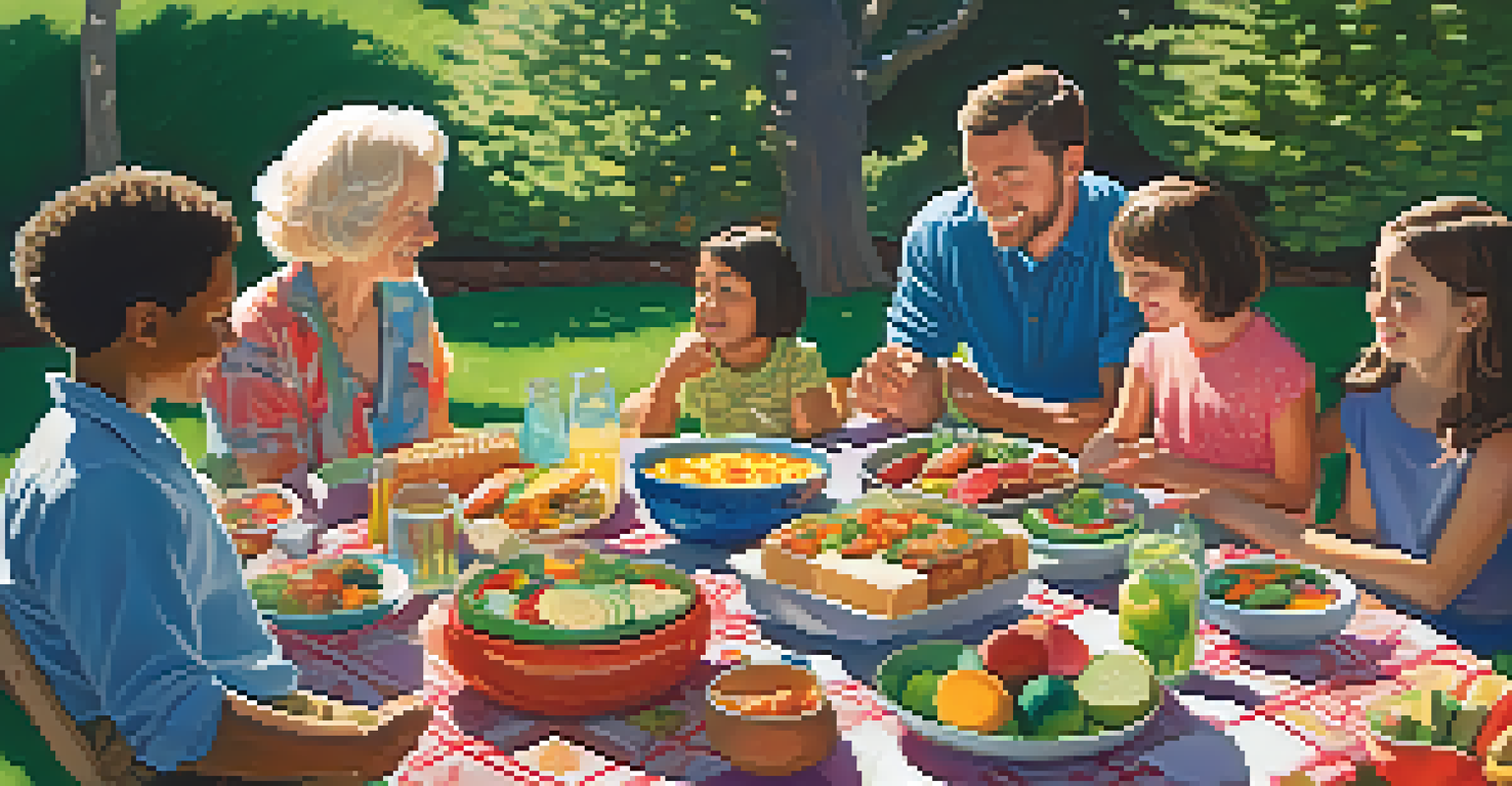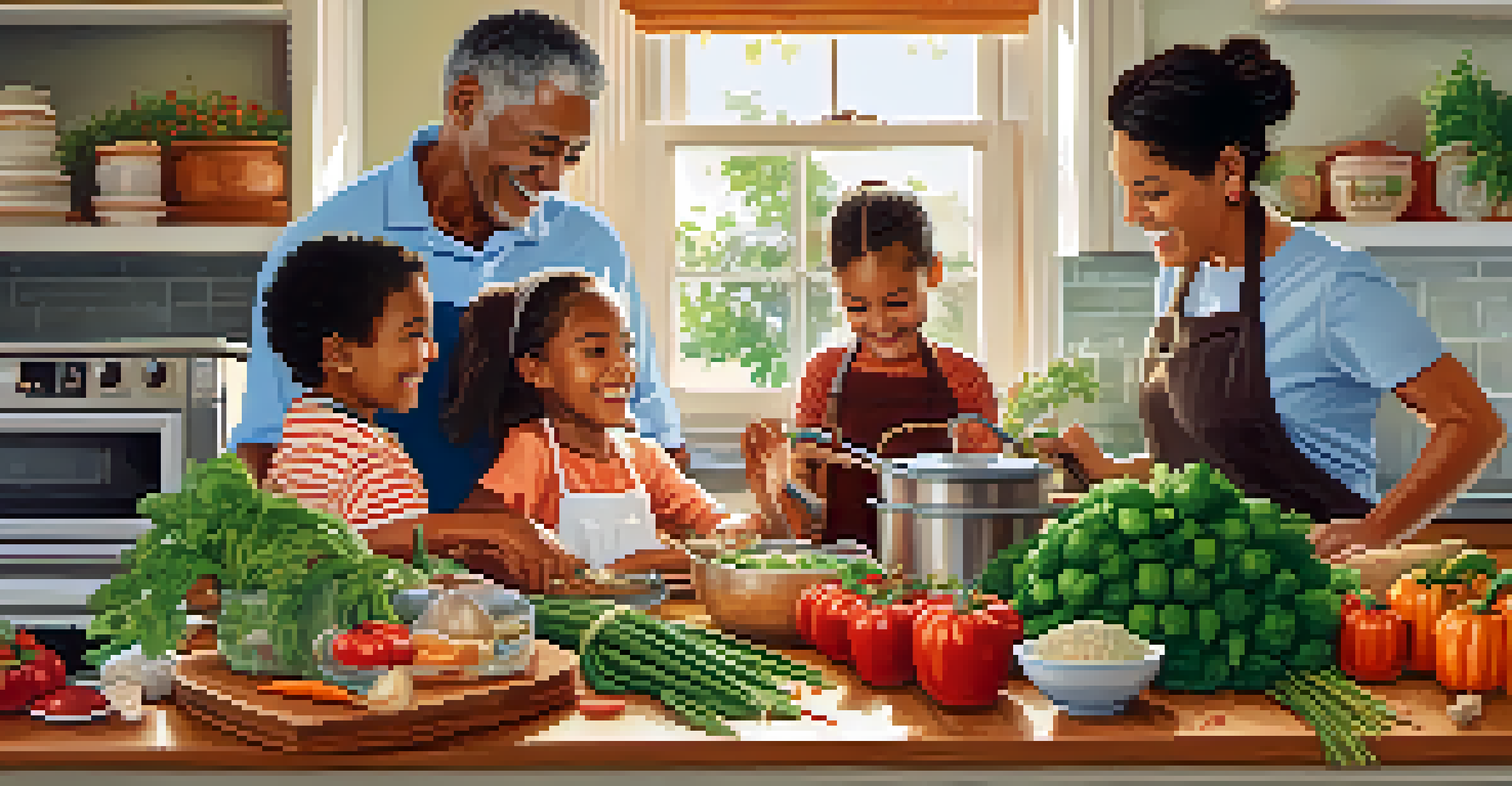Health Benefits of Living in a Multi-Generational Household

Emotional Support and Mental Well-Being
Living in a multi-generational household fosters a strong sense of community and belonging. When family members of various ages share a home, they create a support system that can significantly benefit mental health. For instance, kids can enjoy the wisdom and affection of grandparents, while older adults can find joy and purpose in caring for younger family members.
Family is not an important thing. It's everything.
This emotional support helps reduce feelings of loneliness and isolation, which are common issues, especially among seniors. Engaging regularly with family can boost mood and improve overall emotional wellness. Studies have shown that individuals who feel connected to their families are less likely to experience depression and anxiety.
Moreover, sharing daily experiences and challenges can lead to better coping strategies. Open communication within the household fosters understanding, allowing members to discuss their feelings and seek help when needed. Ultimately, this interconnectedness enhances overall mental well-being.
Enhanced Physical Health through Shared Responsibilities
Multi-generational living can lead to improved physical health for all family members by sharing household responsibilities. When everyone contributes to daily tasks, such as cooking, cleaning, and childcare, it reduces individual stress and promotes a healthier lifestyle. For example, preparing meals together often results in healthier eating habits as family members can collaborate on nutritious options.

In addition, having support with childcare allows parents more time to focus on their health, whether that means exercising or simply resting. This shared approach to household duties can also lead to increased activity levels, as family members engage in physical tasks together. This not only benefits their physical health but also strengthens family bonds.
Emotional Support Boosts Mental Health
Living in a multi-generational household fosters strong emotional connections that can enhance mental well-being and reduce feelings of loneliness.
Moreover, multi-generational households often encourage outdoor activities and family outings, promoting an active lifestyle. Whether it’s walking the dog, gardening, or playing sports, these shared experiences enhance fitness levels while creating lasting memories. All of this contributes to a healthier, happier family.
Financial Benefits and Stress Reduction
Living together as a multi-generational family can lead to significant financial savings. By pooling resources, families can share expenses such as rent or mortgage, utilities, and groceries. This shared financial burden can alleviate stress, allowing family members to focus more on their health and well-being rather than worrying about money.
The love of a family is life's greatest blessing.
Additionally, having multiple earners in the household can provide greater financial stability. It allows families to invest in healthier food options, healthcare, and wellness activities, which can contribute to overall better health. When families work together financially, they can support each other in pursuing healthier lifestyles.
Furthermore, reduced financial stress can lead to improved mental health. Families can enjoy quality time together without the constant worry about financial obligations. This sense of security fosters a nurturing environment, promoting both physical and emotional health.
Strong Intergenerational Relationships and Learning
Multi-generational households create a unique opportunity for intergenerational learning and bonding. Children can learn valuable life lessons from their grandparents, while elderly family members can benefit from the fresh perspectives and energy of younger generations. This reciprocal relationship enhances understanding and respect across ages.
For example, grandparents might share traditional recipes or stories from their youth, fostering a sense of heritage and identity. In return, grandchildren can introduce their elders to modern technology or current trends, keeping them engaged and connected to the world. This exchange of knowledge keeps family members in touch with one another, enriching their lives.
Shared Responsibilities Promote Health
Sharing household duties in multi-generational families leads to healthier lifestyles and strengthens family bonds through collaborative activities.
Moreover, these relationships can lead to enhanced empathy and communication skills. When family members learn to navigate different viewpoints and experiences, they become more adaptable and understanding individuals. This nurturing environment helps build stronger, more resilient family bonds.
Improved Child Development and Learning Opportunities
Children raised in multi-generational households often experience enriched developmental opportunities. With access to multiple adult role models, they can benefit from diverse perspectives and experiences. This variety not only promotes cognitive development but also social skills as they learn to interact with different personalities.
For instance, grandparents can play a crucial role in a child’s education, helping with homework or providing tutoring in subjects they excel in. This additional support can lead to better academic performance and increased confidence in children. Plus, having family members around creates a more stimulating environment for learning.
Furthermore, children in these households often develop a strong sense of family values and respect for elders. They learn to communicate effectively and empathize with different generations, skills that are essential in today's diverse society. Overall, multi-generational living fosters a nurturing environment for holistic child development.
Shared Experiences and Creating Lasting Memories
Living in a multi-generational household provides ample opportunities for shared experiences, which can lead to lasting memories. Family gatherings, game nights, or simple dinners together create an environment rich in love and laughter. These moments not only strengthen familial bonds but also contribute to emotional health.
For example, celebrating holidays together or taking family vacations can be highly enriching. These shared experiences foster a sense of belonging and unity, which is essential for emotional development. The joy of creating memories together can significantly enhance overall life satisfaction for all family members.
Cultural Heritage and Learning Thrive
Multi-generational living allows for the preservation of family traditions and promotes intergenerational learning, enhancing respect and understanding among members.
Moreover, sharing responsibilities for planning events or activities can reduce stress and increase excitement. When everyone contributes to the fun, it brings the family closer together. This collaborative spirit creates a positive atmosphere that benefits everyone's emotional and mental well-being.
Cultural Preservation and Continuity
Multi-generational households play a vital role in preserving family traditions and cultural heritage. When various generations live together, there is a natural exchange of stories, customs, and practices that keep cultural identities alive. This continuity can enhance the sense of belonging and identity for family members, particularly for children.
For instance, grandparents may share traditional recipes, stories, or cultural practices that enrich the family's understanding of their heritage. This sharing not only connects younger generations to their roots but also instills pride in their cultural background. It creates a rich tapestry of experiences that is both educational and meaningful.

Moreover, this cultural transmission can lead to greater respect and appreciation for diversity within the household. As family members learn about each other’s backgrounds, they develop empathy and understanding, which are essential in today’s global society. Ultimately, multi-generational living fosters an environment where cultural values thrive.